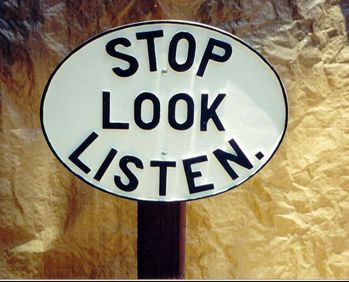Stop, Look, Listen, Smell, Taste, Touch.
What you know of the world comes through the 5 senses. Paying attention to your sensory input can focus the mind on the present. Living in the present can, momentarily, lower anxiety, relieve muscle tension and calm the mind.
Here's a quick exercise, The Senses Check, which takes about a minute to bring you into a tranquil space.
- Stand and take a few deep breaths.
- Slowly rotate in place as you take in the visual information around you. Name everything you see.
- Come back to place and close your eyes and attend to the sounds in your environment. Name the sounds. Locate them in your mind's eye.
- Switch your awareness to smell and identify any odors.
- Now, lick your lips to taste whatever is there.
- Next, switch your attention to touch. How do your clothes feel on your body? How do they feel when you touch each component; soft/hard, warm/cold, rough/smooth. How does your body feel? Notice any kinks, sore spots, muscle tension.
- Inhale deeply and as you exhale release any physical stress.
- Smile!
Do The Senses Check and experience the present moment completely.
Even one episode of mindful practice can be beneficial for your health.
There's beauty at your feet. A mindful walk can be replenishing.








 RSS Feed
RSS Feed
